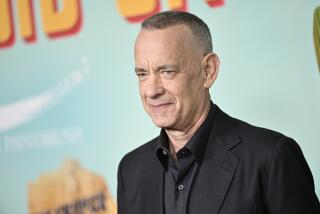Drug Makers Increasingly Bet Fortunes on Fame
- Share via
NEW YORK — Former presidential nominee Bob Dole acknowledges that he takes Viagra. The perfectly composed Joan Lunden suffers from itchy eyes and sneezing. Denver Broncos running back Terrell Davis fights migraine headaches.
No, these people aren’t attending a self-help group for celebrities with ailments. They’re helping drug makers pitch their medications.
As competition in the drug industry intensifies and pressure mounts on companies to build profits, an increasing number of pharmaceutical firms are employing famous actors, politicians and sports stars to attract consumer and physician interest.
“The use of celebrities is the next big way to differentiate a drug,” said Kelly Peters, senior marketing manager for IMS Health, a health information firm based in Plymouth Meeting, Pa.
Celebrity product endorsements are nothing new: “Seinfeld” co-star Julia Louis-Dreyfus touted hair color and Michael Jordan sells underwear and telephone service, among many others. But until last year, drug makers did not use them to market to consumers because the industry’s sole focus was on promoting their products to doctors who prescribe the medications.
The emergence of celebrity drug advertising--to patients and physicians--comes amid an explosion in consumer advertising since the Food and Drug Administration in August 1997 loosened restraints on television and radio commercials for prescription drugs.
In July, Schering-Plough became the first pharmaceutical firm to use a celebrity in a direct-to-consumer national television campaign. It tapped Lunden, former “Good Morning, America” anchor, to promote its prescription allergy pill, Claritin.
The company would not reveal how much she was paid, though analysts have speculated it’s about $1 million a year.
The payoff for Schering-Plough: Claritin worldwide sales soared by 35% last year to $2.3 billion, including $1.9 billion in the United States.
“We saw this as the next step to reach out to consumers,” said Schering-Plough spokesman Bob Consalvo.
Despite their increasing use, celebrities ads still represent only a tiny portion of the billions the industry spends on drug promotion each year. Drug companies still rely on thousands of sales agents to persuade doctors to use their drugs, said Ed Mathers, vice president consumer health-care marketing for Glaxo Wellcome.
But the use of celebrities shows how pharmaceutical firms have become more creative in their marketing. For example, Schering-Plough advertises Claritin on United Airlines baggage tags and Merck offers patients a money-back guarantee on its cholesterol-lowering drug Zocor.
Drug companies use different types of celebrity pitches to sell their products. In some instances, they use those who can give a firsthand testimonial to the effectiveness of the drug, as Lunden did with her hay fever treatment.
Other companies use public figures to raise awareness of an illness to spur visits to a doctor for treatment.
For instance, Pfizer, maker of Viagra--the only pill available for treatment of impotence--will launch an educational campaign on the disorder later this month featuring former Senate Majority Leader Dole. Dole, who survived prostate cancer, won’t mention Viagra by name in the ad.
Yet in other instances, the celebrities are hired guns who use their reputation to pitch specific drugs.
Merck, the world’s largest drug company, hired baseball star Cal Ripkin to promote the company’s hypertension drug Prinivil in ads that appear in medical magazines. Ripkin, as the ads disclose, does not suffer from high blood pressure.
“Cal symbolizes hard work and a solid work ethic,” said Merck spokesman John Bloomfield. “And Prinivil provides hard-work ethic against a disease.”
Mickey Smith, professor of pharmaceutical administration at the University of Mississippi, said the celebrity’s believability is key to making such campaigns work.
“The ads have to make sense,” he said.
Two celebrities who suffer from migraines are working with drug makers to inform patients that new treatments are available. Actress Jennie Garth, of “Beverly Hills, 90210” fame, was hired by Glaxo Wellcome, which sells the leading migraine medication Imitrex. Novartis has contracted with Davis of the National Football League to talk to groups about his experience with its drug Migranol. Davis used the nasal spray during the 1998 Super Bowl, which the Broncos won and Davis was named Most Valuable Player.
Another example: Novartis Pharmaceuticals hired Maureen Reagan, daughter of former President Ronald Reagan, to increase public knowledge of Alzheimer’s as it prepares to launch Exelon, a drug that delays the onset of the disease.
“We wanted a spokesperson to be someone with personal experience,” said Novartis spokesman Harry Hohm.
More to Read
Inside the business of entertainment
The Wide Shot brings you news, analysis and insights on everything from streaming wars to production — and what it all means for the future.
You may occasionally receive promotional content from the Los Angeles Times.










